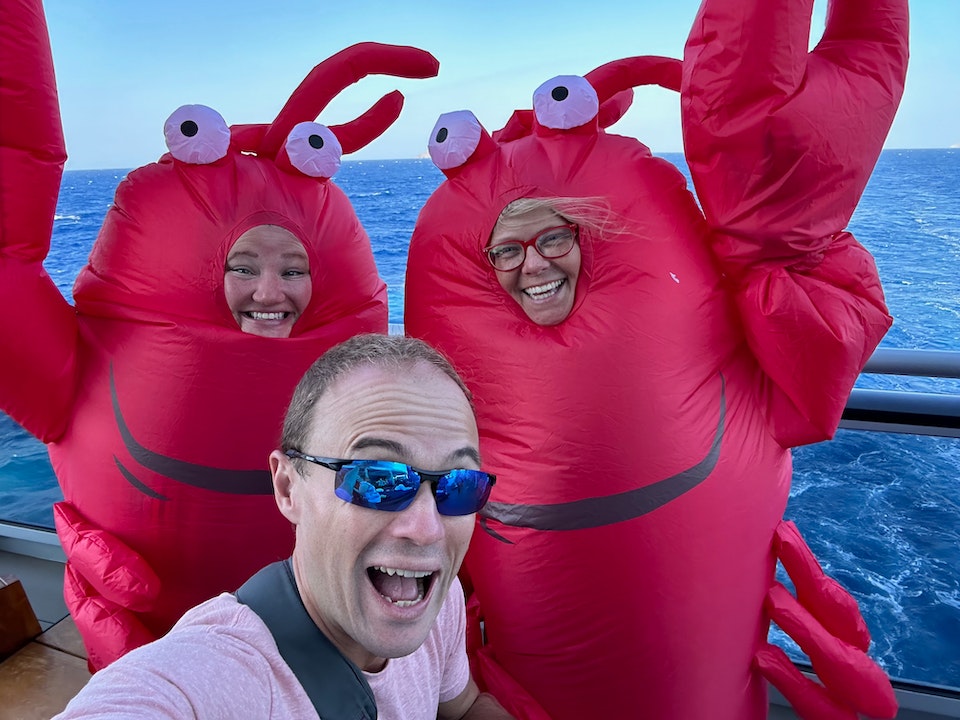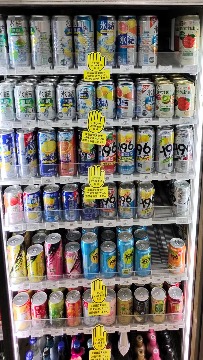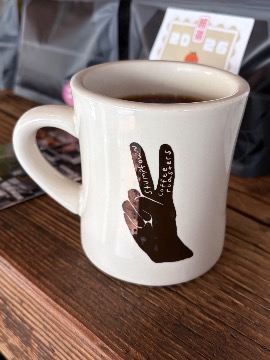You're looking at my e-mail newsletter, Searls of Wisdom, recreated for you here in website form. For the full experience, subscribe and get it delivered to your inbox each month!
Searls of Wisdom for August 2023

Each month, it's my goal to get these newsletters out on the first of the month, and each month I fail. But in fairness to me, I took two overseas vacations in August and neither time did I bring anything to write with. Add to that, I just got home from Greece with that hip new variant of Covid everyone's talking about. So this month's newsletter is now a third of a month late as a result.
I sincerely regret the delay. Please contact refunds@searls.co if you would like to modify or cancel your complimentary subscription.
How I learned to always be interesting
Most of these newsletters seem to start out with an exploration of one of the myriad ways in which I am an odd duck, so I guess I should lean into it and cover one of the big ones:
I am an extremely unlikely professional speaker, entrepreneur (ugh), and salesperson, and yet I find myself having somehow spent three quarters of my career inhabiting those roles.
What I mean here is that my default wiring is extremely different from how you've probably experienced me. I'm introverted and anxious to the point of being an antisocial misanthrope. I thrive in quiet solitude, tinkering on projects nobody will ever know about and accomplishing goals I'll never communicate. I am so risk averse that my brain's idle capacity is exclusively devoted to gaming out worst-case scenarios for everything from career decisions to lunch orders.
In most spaces, I show up as if I were the exact inverse of this. The way I confidently glad-hand strangers as I work a room or persuade sales prospects to close a high-stakes deal makes people think I'm effortlessly extroverted. I plan and attend more social commitments than my people-person family and friends. I have, at times, taken (informed and calculated, but) aggressive risks on which millions of dollars and dozens of people's livelihoods hung in the balance.
It's something I've been puzzling over the last few years: how exactly did the way others perceive me come to deviate so dramatically from how I see myself? (That person is still in there, I swear. Biding his time as I force him to spend years absorbed in activities and roles for which he's not particularly well-suited.)
There's an anecdote from my childhood that floated to the surface recently that may represent a piece of that puzzle, given its impact on the adult I would later become. If you'll indulge my retelling of it, you may find something of use as you reflect on however your life calls on you to "perform" for others.
One time, at theater camp
During summer break when I was nine or ten years old, my mom signed me up for a drama camp at our local theater.
I don't remember why. I don't remember much about it. I just remember showing up on the first day and having a bad time.
It started when I walked in for registration, incredibly nervous that I'd be forced to go on stage and sing or dance in front of others. Right off the bat, my name had been mistakenly written down as "Justine Searls". The camp's staff were themselves between 15 and 20 years old, and they reacted to this mistake not with compassion but with cruelty: teasing me, treating me like a girl, and telling the other kids to refer to me as Justine.
Super.
That same day, one of the counselors sat in the center of the theater and called up the kids, one by one, to stand alone on stage in the spotlight. He mockingly called "Justine" up first.
Through sheer force of will, I convinced my legs to drag themselves up the stairs until I experienced the disorientating brightness and uncomfortable heat of spotlights for the first time. It felt like a witness interrogation.
"What did you do this summer?"
Ah, an easy one. I know this. "We went to my grandpa's trailer on Lake Michigan in the U.P.," I started, before devolving into the sort of nervous rambling that talkative nine-year-old boys often give into.
"And what happened to your legs?"
My legs were covered in scabs. The scabs you get after scratching mosquito bites and then not letting them heal, no matter how many times your mom tells you to leave them be. I suddenly realized everyone was staring at my legs, and I'd been asked to explain myself.
It sent me scrambling. I had to think of an excuse. I wasn't the brazen, shameless person I am today. (Had I only been ten years older, I would have known the correct answer was, "my name is Justine, I am a scab picker, and you can all go to hell.")
So I made something up. We did a lot of hiking in the woods. Got a lot of scrapes from low-lying branches. Some barely-plausible bullshit like that. I was finally getting comfortable with my lie, "and so we were in the forest running—"
"–NOBODY CARES!", the counselor cut me off. The room fell silent.
He paused, for effect. "…Nobody cares. If you want us to listen to you, it needs to be interesting. Or entertaining. Or useful. As soon as it's boring, people will tune out. Nobody actually cares what you did this summer, and the only way to make them care is to tell them a story worth listening to. The worst thing you can be is boring."
As a firstborn child whose mother heaped praise on even the most meager of my accomplishments, no authority figure had ever talked to me this way.
I stood there, speechless. I was expecting to hear a "but" to soften the blow, or to receive some kind of conciliatory encouragement, or to be given another chance.
Nope. "Elyse, you're up!"
I took my cue and scampered off the stage to sit down, mortified. If I managed to return for any of the subsequent days of the camp, I successfully repressed all memory of it.
Telling a good story
It's a shame when you learn an important life lesson from an asshole.
If only someone kinder had come along and gently walked me through the importance of speaking with the listener's interests in mind. Or had pulled me aside one-on-one to spare me the humiliation of dressing me down in front of a hundred classmates. Or waited until I was developmentally ready to hear any of this—allowing me to be a silly, carefree child for a few more years.
It's easy to think things like that when a painful lesson is learned in a painful way, but for me, in this case, it had to be this way. I know myself, and no amount of feedback designed to protect my ego would have gotten through to me. Deep down, I know the fact this happened in front of the girl I had a crush on quadrupled its potency. And if I'd been much older, I would have been better equipped to deflect it with a sarcastic retort to prevent it from sinking in.
No, in the grand scheme of things, I'm actually grateful I had this experience. And as much as I wish the encounter had been less (lower-case 't') traumatic, I'm also convinced that a softer blow wouldn't have landed hard enough to meaningfully change me.
And this event did change me. How I talk. How I write. How I speak on stage. There is a direct line from this moment to how I conceive of what "communication" even is. At ten years old, I learned that if I wanted an audience, I had to earn their attention. I learned that the most effective way to earn that attention wasn't to wait my turn, or point to my credentials, or ramble incessantly, but to creatively spark interest and then find a way to hold it. And I learned this years before I otherwise would have—years before my peers, years before my first creative writing elective, years before the emergence of the "attention economy"—which gave me the time to figure out how to make myself interesting while I was still figuring out who "myself" even was.
If it wasn't for this one shitty day at theater camp, I doubt I would have found any success writing for gaming outlets semi-professionally in middle school. Or publishing comedic essays and comics in high school. Or blogging and speaking about programming in my career. Everything I say is custom-tailored with the listener in mind. Every sentence is designed to achieve a purpose—even when that purpose is to provide someone with world-class idle banter as I stall for time to decide on that lunch order I've been worrying about.
I have no idea who this prick of a camp counselor was, why he got off on making fun of grade schoolers, or what tragic end befell him. But he gave me a gift of awareness that nobody else did, and I managed to use that gift—made more potent by the bitter pill it was encased in—to dramatically improve my social and financial prospects well into adulthood.
Throughout society, we are living in an era where all kinds of assholes are finally getting their due. And that's generally a great thing. The world needs more peace, kindness, and acceptance. But it doesn't change the fact that some of the most important lessons I've learned in my life have been meted out by insensitive and brash assholes who didn't care about my feelings.
That's why I'm glad I'm self-critical enough to listen to and consider anyone's feedback. I am not thick-skinned. When someone says something shitty to me it's going to sting either way, so it can't hurt to take a moment to search for a silver lining. Increasingly, I've seen people dismiss important messages because they were delivered by imperfect messengers, and that always strikes me as a missed opportunity.
But what do I know? Your mileage may vary.
Other stuff going on
As always, there's other Searls stuff going on.
As teased in June I have finally wrapped up work on Mocktail 2.0, the mocking library for Ruby you don't need to care about. (Unless you do! In which case you might enjoy that I transformed the README into something between a choose-your-own adventure book and a traveler's compendium).
In mid-August, my colleague Landon and I had a fun podcast conversation with the Changelog folks. It got over 40,000 downloads, which is a number for which I have no context, but seems good? Way better than 30,000 but sadly far short of 50,000.
Also, this Friday at 1pm eastern I am "pairin' with Aaron", the goofy nickname of my good friend, Tenderlove Patterson. We're going to try to start coding a minimal test runner for Ruby, from scratch. You can click a thing to be notified when the stream goes live. It's sure to be edutaining.
In non-Searls news, I'm looking forward to Apple's annual September Event on Tuesday. I'm steeling myself for inevitably experiencing the irrational desire to get the iPhone 15 Pro Max just so I can have a 6x optical zoom attached to a sensor that's too small and slow to produce good photos. And I'm already itching to replace my year-old AirPods Pro with an identical set just to get the new USB-C case so I can stop traveling with a lightning cable. Do you also find yourself succumbing to the reality distortion field of every Apple event? Reply to this e-mail to let me know what you're buying, so I can feel slightly less absurd about it.
Okay, that's enough of this nonsense. Go have yourself a September.

